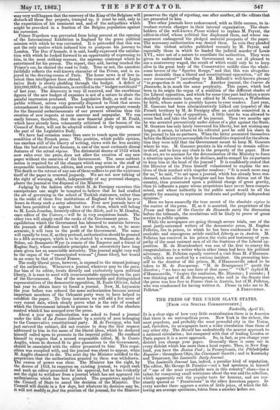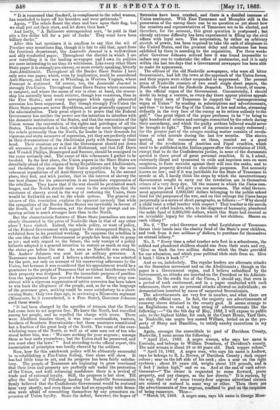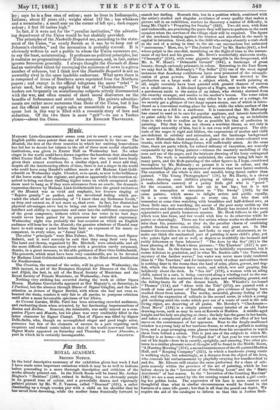THE PRESS OF THE UNION SLAVE STATES.
[FROM OUR SPECIAL CORRESPONDENT.] Nashville, April 25.
IT is a clear sign of how very little centralization there is in America that there is no metropolitan press. New York is the richest, the most populous, and probably the most powerful city in the Union, and, therefore, its newspapers have a wider circulation than those of any other city. The Herald has undoubtedly the nearest approach to a national circulation; but compared with that of leading London or Paris papers it is a mere approach. So, in fact, as you change your district you change your paper. Generally there is some one in every district which has more than a local repute. Thus, in New Eng- land, you have the Boston Post; in Pennsylvania, the Philadelphia Enquirer; throughout Ohio, the Cincinnati Gazette; and in Kentucky and Tennessee, the Louisville Daily Journal.
The Louisville Journal has, indeed, a peculiar kind of reputation. The editor, Mr. George D. Prentice—not a bad specimen in himself of " one of the most remarkable men in this country" class—has a talent for composing small witticisms about the war and the rebellion, which apparently suit the popular taste for humour, and are con- stantly quoted as " Prenticeana" in the other American papers. In every number there appears a series of little jokes, of which the fol- lowing are average specimens, taken from a number before me,
" It is rumoured that the devil, in compliment to the rebel women, has concluded to leave off his breeches and wear petticoats." Again, " The rebels flaunt the stars and bars upon their flag, but we shall put out their stars, and let down their bars." And lastly, " A Baltimore correspondent says, he paid in that city a five dollar bill for a pair of ducks.' They must have been billiary ducks."
After this last specimen it is needless to say that the wit of Prentice may sometimes flag, though it is fair to add that, apart from the facetious department, the Louisville Journal is a well-written and ably conducted paper. Throughout the district in which I am now travelling it is the leading newspaper and I own its politics are more interesting to me than its witticisms. Like every other Slave State paper it is strongly pro-slavery, or more strictly speaking, bitterly Anti-Abolitionist. Throughout all the Border Slave States I have only seen one paper, which, even by implication, could be considered Anti-Slavery, and that was at Wheeling, in Western Virginia, where Fremont is stationed. Of course, too, the Louisville Journal is strongly Pro-Union. Throughout these Slave States where secession is rampant, and where the scene of war is close at hand, the censor- ship has naturally been much stricter, though less vexatious, than in the Free States; and every newspaper which openly advocated secession has been suppressed. But though strongly Pro-Union the Slave State papers are never Republican, and are generally opposed to the administration. Their great object is to prove that the Federal Government has neither the power nor the intention to interfere with the domestic institutions of the States, and that the restoration of the Union means the restoration of the rights and privileges of all the States. The curious fact is that, whilethey are far more bitter against the rebels personally than the North, far louder in their demands for vigorous and stern measures of repression, yet they are perfectly rabid in their denunciations of the Abolitionist party with Stunner at their bead. Their constant cry is that the Government should put down all secession at Boston as well as at Richmond, and that Jeff. Davis and Wendell Phillips, Beauregard and Sumner, should be consigned to the same untimely end. The cause of this vehemence I gather to be twofold. In the first place, the Union papers in the Slave states are dreadfully afraid of the stigma of being Republicans and Abolitionists, and therefore they atone for their Union proclivities by the most vehement repudiation of all Anti-Slavery sympathies. In the second place, they feel, and with justice, that in the interest of slavery the one best chance for its preservation is an immediate suppression of the rebellion. They know that if the war should be protracted much longer, and the North should once come to the conviction that the existence of slavery stood in the way of restoring the Union, there would be forthwith an end to the whole system. The general ex- istence of this conviction explains the apparent anomaly. that while the sympathies of the Border Slave States are inevitably in favour of the South, if not of Secession, yet the demand for prompt and un- sparing action is much stronger here than in the North. But the characteristic features of Slave State journalism are more clearly illustrated in the press of Nashville than in that of any other place I have visited. Indeed, the whole policy, or want of policy, of the Federal Government with regard to the reconquered States, is exhibited here in its practical working. To suppress the rebellion is the one idea that either Government or people has been able to grasp as yet; and with regard- to the future, the only vestige of a policy hitherto adopted is a general intention to restore as much as may be the status quo before the war. As soon as Nashville was retaken, Mr. Andrew Johnson was sent here as military governor. A Tennessee man himself, and I believe a slaveholder, he was selected for the post, not only on account of his unswerving adherence to the Union, but because it was considered that his appointment would be a guarantee to the people of Tennessee that no violent interference with their property. was designed. For the immediate purpose of pacifica- tion the appointment has proved a fortunate one. Every step con- sistent with a rigorous suppression of active secession has been taken to win back the allegiance of the people, and, as far as the language of the governor goes, nothing could be more satisfactory to a slave- owning State. Only two days ago, in reviewing a Minnesota regiment (Minnesota, be it remembered, is a Free State), Governor Johnson used these words ;
"It had been charged by the apostles of treason that the North had come here to set negroes free. He knew the ]North, had travelled among her people, and he repelled the charge with scorn. There were Abolition fanatics there, it was true—sectionalists, traitors, brothers of Southern Secessionists—but these creatures constituted but a fraction of the great body of the North. The voice of the over- whelming mass of the North, as well as of nine men out of ten who stood before him, was : We care nothing for your negroes ; manage them as best snits yourselves; but the Union shall be preserved, and you must obey the laws.' " And according to the official report, this enunciation of principles was loudly cheered by the soldiers.
Now, how far this patchwork policy will be ultimately successful in re-establishing a Pro-Union feeling, time alone will show. It has had little time to act, and its progress has been fairly satisfac- tory. The people of Tennessee are beginning to grow convinced that their lives and property are perfectly safe under the protection of the Union, and with returning confidence there is a revival of trade and of externanoyalty. Still, the progress is but slow. Till after the battle of Pittsburg landing the Nashville Secessionists firmly believed that the Confederate Government would be restored here very shortly, and even those who had no sympathy with Seces- sion were afraid of committing themselves by any premature ex- pression of Union loyalty. Since the defeat, however, the hopes of Secession have been crushed, and there is a decided increase of Union sentiment. With East Tennessee and Memphis still in the possession of the enemy there can be no question as yet about how the senators and representatives of Tennessee are to be elected, and therefore, for the moment, this great question is postponed ; but already extreme difficulty has been experienced in filling up the civil offices with loyal men. The corporation, by rather an arbitrary stretch of power, has been required to take the oath of allegiance to the United States, and the greatest delay and reluctance has been exhibited by them in acceding to the requisition. For three weeks after Governor Johnson arrived here it was found impossible to induce any one to undertake the office of postmaster, and it is only within -the last ten days that a Government newspaper has been able to make its appearance.
The editors of the old Nashville newspapers, who were all bitter Secessionists, had left the town at the approach of the Union forces, and their papers were either suspended or suppressed. The present press of Nashville consists of two small single sheet papers, the Nashville Union and the Nashville Despatch. The former, of course, is the official organ of the Government. Commercially, I should doubt its being a success, as every day there appear piteous appeals to the loyal men of Tennessee to support the "uncompromising organ of Union" by sending in subscriptions and advertisements, and thus " to keep the flag of the Union, of law and order, streaming defiantly in the very face of the enemy as he retires sullenly to the gulf." One great object of the paper professes to be "to bring to light hundreds of crimes and outrages committed by the rebels during their ascendancy, and which the guilty authors believed would never be brought to light." This part of its promise is amply redeemed ; for the greater part of the meagre reading matter consists of revela- tions of rebel misrule during the last few months. The stories quoted, and the comments on them, remind me a good deal of the revelations of Austrian and Papal cruelties, which used to be published in the Italian papers after the revolution of 1859, except that to do the Confederates justice, in none of the documents quoted is there proof of great personal cruelties. It is, I admit, extremely illegal and tyrannical to exile and imprison men on mere suspicion, to force recruits against their will into the ranks, and to confiscate property devoted to charitable purposes. But necessity knows no Jaw; and if it was justifiable for the State of Tennessee to secede at all, I hardly think the steps by which the insurrectionary Government sought to carry out the revolution are in themselves crimes of a very deep dye. Of the manner in which the Union com- ments on the past I will give you one specimen. The rebel Govern- ment appropriated 2,000,000 dollars belonging to the public school fund for the purposes of the war, and on this outrage the Union harps perpetually in a series of short paragraphs, as follows:—" Why should a child treat a rebel teacher with respect That teacher is the servile follower of rebel leaders, who, to the disgrace of humanity, plundered the noble fund of 2,000,000 dollars, which this State had created as an inviolable legacy for the education of her children. Shame on such villany !"
No. 2. "The rebel Governor and rebel Legislature of Tennessee thrust their hands into the charity fund of the State'spoor children, and took from it two millions of dollars, to purchase for themselves an eternal infamy."
No. 3. " Every time a rebel teacher sets foot in a schoolroom, the robbed and plundered children should rise from their seats and cry, Give us back the two million dollars which the State provided for our education, and which your political idols stole from us. Give it back ! Give it back I!'" And so on, indefinitely. The regular leaders are alternate attacks on the Secession movement and on the Abolitionists ; though as the paper is a Government organ, and I believe subsidized by the Government, no attacks are inserted on the President or his Adminis- tration. To the credit too of the Union, I should say, that even in a period of such excitement, and in a paper conducted with such vehemence, there are no personal attacks allowed on individuals ; no denunciations inserted by name of suspected Secessionists.
The advertisements are very few in number, and what there are are chiefly official ones. In fact, the majority are advertisements of runaway slaves detained in the county gaol. It seems strange to an Englishman to read a long string of advertisements like the following :—" On the 8th day of May, 1862, I will expose to public sale, to the highest bidder, for cash, at the Court House, Yard Gate, in Nashville, one negro boy named William, levied on as the pro- perty of Sharp and Hamilton, to satisfy sundry executions in my hands."
Again, amongst the committals to gaol of Davidson County, Nashville, I come across the following: " April 21st, 1862. A negro woman, who says her name fs Lucinda, and belongs to William Donelsou, of Davidson's county. The said woman is about 28 or 30 years old. Dark copper colour."
April 18, 1862. A negro man, who says his name is Andrew, says he belongs to R. L. Brown, of Davidson County ; dark copper colour ; scar on the left side of his neck ; also a scar on the right eyebrow; about 28 years old, weighs about 158 pounds, and is 5 feet 7 inches high," and so on. And at the end of each adver- tisement.—" The owner is requested to come forward, prove property, and pay charges, as the law directs." It is curious, by the way, that out of some twenty-four negroes advertised sixteen are scarred or maimed iu some way or other. Then there are the advertisements of free negroes, confined to gaol on the suspicion of being runaways. Thus—
"March 16, 1862. A negro man, says his name is George Mose- ley ; says he is a free man of colour; says he lives in Indianopolis, Indiana; about 37 years old; weighs about 187 lbs.; has whiskers and a moustache ; a small scar on the corner of left eye ; dark copper colour ; 5 feet 10 inches high." In fact, if it were not for the " peculiar institution," the advertis- ing department of the Union would be but shabbily provided. - The principles of the Nashville Despatch are, according to the state- ment of the Union, "as nearly Secesh as it can be to keep out of Johnson's clutches," and the accusation is probably correct. It is obviously written to suit a public to whom the Union successes are, to say the least, uninteresting. It professes no political principles, but it contains no prognostications of Union successes, and, in fact, rather ignores Secession generally. I always thought the Giornale di Roma had an unrivalled talent for conveying the minimum of news in a given number of columns, but I think now the Nashville Despatch is not an unworthy rival in the same laudable endeavour. What news there is is composed of items of Southern news reprinted from the Northern papers ; and except in the official telegrams the name "rebel " is never used, but always supplied by that of " Confederate." The leaders are frequently on miscellaneous subjects utterly disconnected with the war, and often consist of short moral discourses on the benefits of forbearance and strict integrity. The private advertise- ments are rather more numerous than those of the Union, but it has not the official ones of negro sales or committals to prisons. The space lost in this way is filled with a romantic story of love and seduction. Of the two there is more "grit"—to use a Yankee
































 Previous page
Previous page